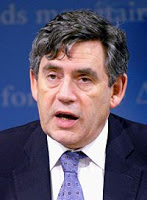Neuroscience
 Thanks to the expenses scandal, storm clouds of controversy continue to gather over the palace of Westminster. A clue as to how our elected leaders landed themselves in such a mess is provided by a timely new article in the prestigious psychology and neuroscience journal Brain.
Thanks to the expenses scandal, storm clouds of controversy continue to gather over the palace of Westminster. A clue as to how our elected leaders landed themselves in such a mess is provided by a timely new article in the prestigious psychology and neuroscience journal Brain.
In the paper, Lord David Owen, a former British foreign secretary and now a member of the House of Lords, and psychiatrist Jonathan Davidson, together argue that many of our elected leaders have shown signs of 'Hubris Syndrome' - a form of acquired personality disorder.
"The key concept," they write, "is that hubris syndrome is a disorder of the possession of power, particularly power which has been associated with overwhelming success, held for a period of years and with minimal constraint on the leader."
The pair go on to detail the fourteen key features of hubris syndrome, including using the royal "we" in conversation; losing contact with reality; and showing excessive self-confidence. Particularly relevant to the current expenses scandal consuming British politics are the following three criteria: "allows moral rectitude to obviate consideration of practicality, cost or outcome", "manifestly has contempt for others" and "displays incompetence with disregard for nuts and bolts of policy making". Owen and Davidson state that hubris syndrome can "affect anyone with power", thus allowing for the possibility that the lower echelons of our political class may also be vulnerable to this postulated condition.
 Applying their criteria to British Prime Ministers and US Presidents in office over the last 100 years, Owen and Davidson identify several cases of probable hubris syndrome. Tony Blair, Margaret Thatcher and Neville Chamberlain are among the British Prime Ministers considered to have developed hubris syndrome, while Clement Attlee, Harold Macmillan and John Major are among those considered to have led without acquiring the condition. Among US Presidents, George W Bush is listed as the only definite case of hubris syndrome, with his appearance on an aircraft carrier in front of the words "mission accomplished" cited as the high point of the condition.
Applying their criteria to British Prime Ministers and US Presidents in office over the last 100 years, Owen and Davidson identify several cases of probable hubris syndrome. Tony Blair, Margaret Thatcher and Neville Chamberlain are among the British Prime Ministers considered to have developed hubris syndrome, while Clement Attlee, Harold Macmillan and John Major are among those considered to have led without acquiring the condition. Among US Presidents, George W Bush is listed as the only definite case of hubris syndrome, with his appearance on an aircraft carrier in front of the words "mission accomplished" cited as the high point of the condition.
Regarding Thatcher - she, of course, famously began to refer to herself in the third person, as in "We have become a grandmother." Meanwhile, Blair's hyperactive travel and hyperbolic speeches are considered by Owen and Davison as clear signs of hubris syndrome. They cite Blair's comments over Iraq as further evidence: "If you have faith about these things, then you realise that judgement is made by other people. If you believe in God, it's made by God as well."
As for Prime Minister Gordon Brown, Owen and Davidson say only time will tell. However, they do point to early signs of hubris syndrome. Shortly before becoming PM, Brown claimed to have ended boom and bust and he said of the first decade of the 21st century that "the greatest restructuring of the global economy, perhaps even greater than the industrial revolution, a new world order was created." It wasn't many months later that the world faced its worst financial crisis for 70 years.
 Owen and Davidson do warn about the dangers of diagnosis at a distance."Premature, uncritical, dissemination of labels should be avoided," they write. However, they appear to be genuinely concerned by the harm that hubris syndrome could cause. "The potential importance of the syndrome derives ... from the extensive damage that can be done by the small number of people who are affected," they say.
Owen and Davidson do warn about the dangers of diagnosis at a distance."Premature, uncritical, dissemination of labels should be avoided," they write. However, they appear to be genuinely concerned by the harm that hubris syndrome could cause. "The potential importance of the syndrome derives ... from the extensive damage that can be done by the small number of people who are affected," they say.
As for treatment and prevention, Owen and Davidson see most immediate hope in political systems - such as the two-term limit on US Presidents - and climates in which leaders are held accountable for their actions. "Qualities protective against disproportionate hubris, like humour and cynicism are worth mentioning," they add. "But nothing can replace the need for self-control, the preservation of modesty while in power, the ability to be laughed at, and the ability to listen to those who are in a position to advise."
_________________________________
 Owen, D., & Davidson, J. (2009). Hubris syndrome: An acquired personality disorder? A study of US Presidents and UK Prime Ministers over the last 100 years Brain, 132 (5), 1396-1406 DOI: 10.1093/brain/awp008
Owen, D., & Davidson, J. (2009). Hubris syndrome: An acquired personality disorder? A study of US Presidents and UK Prime Ministers over the last 100 years Brain, 132 (5), 1396-1406 DOI: 10.1093/brain/awp008
Post written by Christian Jarrett (@psych_writer) for the BPS Research Digest.
- Link Feast
In case you missed them - 10 of the best psychology links from the past week: 1. The US government needs a "Council of Psychological Advisors" to complement the existing Council of Economic Advisors. So argues Barry Schwartz in an essay for...
- Does Gordon Brown Have A Personality Disorder?
Yesterday, The Times published an article of questionable virtue by its resident medical columnist, Dr Thomas Stuttaford, in which he implies that both Tony Blair and Gordon Brown have personality disorders. "...[I]t is interesting that Tony Blair, charming...
- Extras
Studies that didn't make the final cut this fortnight: How children develop an understanding of the dangers of crossing roads. Treating a woman with Down's Syndrome whose fear of her feet being touched was impeding vital physiotherapy. Is chronic...
- Abnormal Social Cognition
To investigate the neuroscience behind socialising, Andreas Meyer-Lindenberg and colleagues have scanned the brains of people with the genetic disorder Williams-Beuren syndrome and compared them with scans of healthy controls. People with Williams syndrome...
- News From The Fda: Onfi Tablets (clobazam) For Adjunctive Treatment In Lennox-gastaut Syndrome
From the FDA: FDA NEWS RELEASE For Immediate Release: Oct. 24, 2011 FDA approves Onfi to treat severe type of seizures On Oct. 21, the U.S. Food and Drug Administration approved Onfi tablets (clobazam) for use as an adjunctive (add-on) treatment for...
Neuroscience
Are British politicians suffering from hubris syndrome?
 Thanks to the expenses scandal, storm clouds of controversy continue to gather over the palace of Westminster. A clue as to how our elected leaders landed themselves in such a mess is provided by a timely new article in the prestigious psychology and neuroscience journal Brain.
Thanks to the expenses scandal, storm clouds of controversy continue to gather over the palace of Westminster. A clue as to how our elected leaders landed themselves in such a mess is provided by a timely new article in the prestigious psychology and neuroscience journal Brain.In the paper, Lord David Owen, a former British foreign secretary and now a member of the House of Lords, and psychiatrist Jonathan Davidson, together argue that many of our elected leaders have shown signs of 'Hubris Syndrome' - a form of acquired personality disorder.
"The key concept," they write, "is that hubris syndrome is a disorder of the possession of power, particularly power which has been associated with overwhelming success, held for a period of years and with minimal constraint on the leader."
The pair go on to detail the fourteen key features of hubris syndrome, including using the royal "we" in conversation; losing contact with reality; and showing excessive self-confidence. Particularly relevant to the current expenses scandal consuming British politics are the following three criteria: "allows moral rectitude to obviate consideration of practicality, cost or outcome", "manifestly has contempt for others" and "displays incompetence with disregard for nuts and bolts of policy making". Owen and Davidson state that hubris syndrome can "affect anyone with power", thus allowing for the possibility that the lower echelons of our political class may also be vulnerable to this postulated condition.
 Applying their criteria to British Prime Ministers and US Presidents in office over the last 100 years, Owen and Davidson identify several cases of probable hubris syndrome. Tony Blair, Margaret Thatcher and Neville Chamberlain are among the British Prime Ministers considered to have developed hubris syndrome, while Clement Attlee, Harold Macmillan and John Major are among those considered to have led without acquiring the condition. Among US Presidents, George W Bush is listed as the only definite case of hubris syndrome, with his appearance on an aircraft carrier in front of the words "mission accomplished" cited as the high point of the condition.
Applying their criteria to British Prime Ministers and US Presidents in office over the last 100 years, Owen and Davidson identify several cases of probable hubris syndrome. Tony Blair, Margaret Thatcher and Neville Chamberlain are among the British Prime Ministers considered to have developed hubris syndrome, while Clement Attlee, Harold Macmillan and John Major are among those considered to have led without acquiring the condition. Among US Presidents, George W Bush is listed as the only definite case of hubris syndrome, with his appearance on an aircraft carrier in front of the words "mission accomplished" cited as the high point of the condition.Regarding Thatcher - she, of course, famously began to refer to herself in the third person, as in "We have become a grandmother." Meanwhile, Blair's hyperactive travel and hyperbolic speeches are considered by Owen and Davison as clear signs of hubris syndrome. They cite Blair's comments over Iraq as further evidence: "If you have faith about these things, then you realise that judgement is made by other people. If you believe in God, it's made by God as well."
As for Prime Minister Gordon Brown, Owen and Davidson say only time will tell. However, they do point to early signs of hubris syndrome. Shortly before becoming PM, Brown claimed to have ended boom and bust and he said of the first decade of the 21st century that "the greatest restructuring of the global economy, perhaps even greater than the industrial revolution, a new world order was created." It wasn't many months later that the world faced its worst financial crisis for 70 years.
 Owen and Davidson do warn about the dangers of diagnosis at a distance."Premature, uncritical, dissemination of labels should be avoided," they write. However, they appear to be genuinely concerned by the harm that hubris syndrome could cause. "The potential importance of the syndrome derives ... from the extensive damage that can be done by the small number of people who are affected," they say.
Owen and Davidson do warn about the dangers of diagnosis at a distance."Premature, uncritical, dissemination of labels should be avoided," they write. However, they appear to be genuinely concerned by the harm that hubris syndrome could cause. "The potential importance of the syndrome derives ... from the extensive damage that can be done by the small number of people who are affected," they say.As for treatment and prevention, Owen and Davidson see most immediate hope in political systems - such as the two-term limit on US Presidents - and climates in which leaders are held accountable for their actions. "Qualities protective against disproportionate hubris, like humour and cynicism are worth mentioning," they add. "But nothing can replace the need for self-control, the preservation of modesty while in power, the ability to be laughed at, and the ability to listen to those who are in a position to advise."
_________________________________
 Owen, D., & Davidson, J. (2009). Hubris syndrome: An acquired personality disorder? A study of US Presidents and UK Prime Ministers over the last 100 years Brain, 132 (5), 1396-1406 DOI: 10.1093/brain/awp008
Owen, D., & Davidson, J. (2009). Hubris syndrome: An acquired personality disorder? A study of US Presidents and UK Prime Ministers over the last 100 years Brain, 132 (5), 1396-1406 DOI: 10.1093/brain/awp008Post written by Christian Jarrett (@psych_writer) for the BPS Research Digest.
- Link Feast
In case you missed them - 10 of the best psychology links from the past week: 1. The US government needs a "Council of Psychological Advisors" to complement the existing Council of Economic Advisors. So argues Barry Schwartz in an essay for...
- Does Gordon Brown Have A Personality Disorder?
Yesterday, The Times published an article of questionable virtue by its resident medical columnist, Dr Thomas Stuttaford, in which he implies that both Tony Blair and Gordon Brown have personality disorders. "...[I]t is interesting that Tony Blair, charming...
- Extras
Studies that didn't make the final cut this fortnight: How children develop an understanding of the dangers of crossing roads. Treating a woman with Down's Syndrome whose fear of her feet being touched was impeding vital physiotherapy. Is chronic...
- Abnormal Social Cognition
To investigate the neuroscience behind socialising, Andreas Meyer-Lindenberg and colleagues have scanned the brains of people with the genetic disorder Williams-Beuren syndrome and compared them with scans of healthy controls. People with Williams syndrome...
- News From The Fda: Onfi Tablets (clobazam) For Adjunctive Treatment In Lennox-gastaut Syndrome
From the FDA: FDA NEWS RELEASE For Immediate Release: Oct. 24, 2011 FDA approves Onfi to treat severe type of seizures On Oct. 21, the U.S. Food and Drug Administration approved Onfi tablets (clobazam) for use as an adjunctive (add-on) treatment for...
